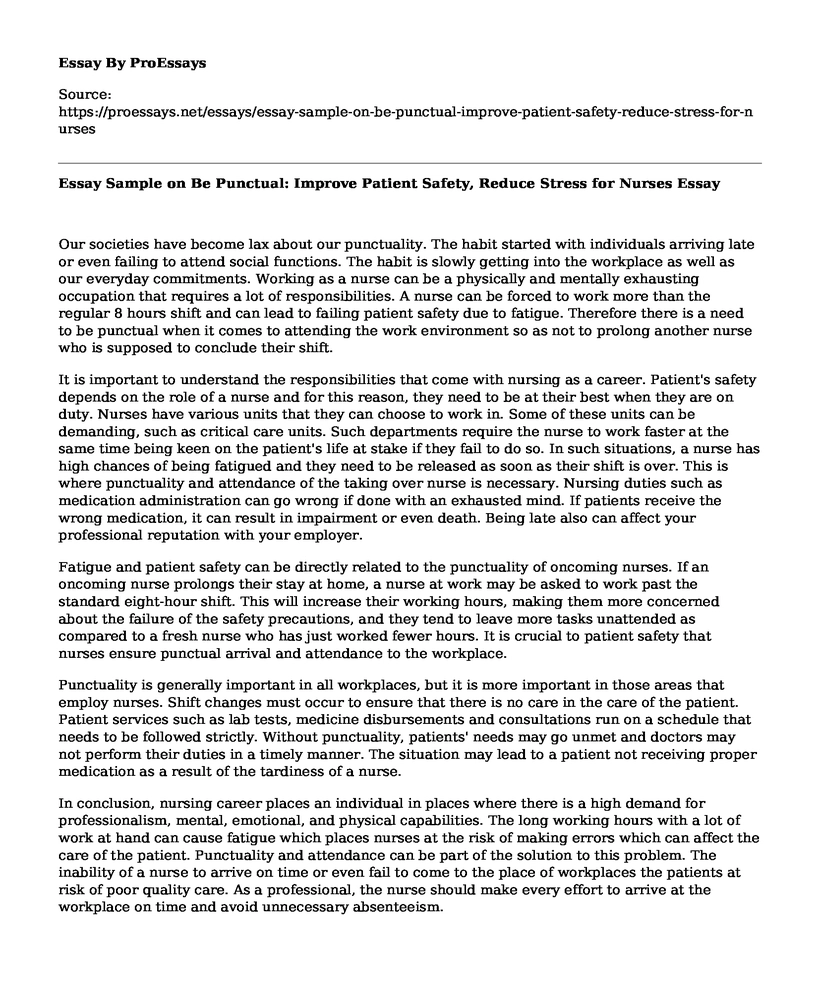Our societies have become lax about our punctuality. The habit started with individuals arriving late or even failing to attend social functions. The habit is slowly getting into the workplace as well as our everyday commitments. Working as a nurse can be a physically and mentally exhausting occupation that requires a lot of responsibilities. A nurse can be forced to work more than the regular 8 hours shift and can lead to failing patient safety due to fatigue. Therefore there is a need to be punctual when it comes to attending the work environment so as not to prolong another nurse who is supposed to conclude their shift.
It is important to understand the responsibilities that come with nursing as a career. Patient's safety depends on the role of a nurse and for this reason, they need to be at their best when they are on duty. Nurses have various units that they can choose to work in. Some of these units can be demanding, such as critical care units. Such departments require the nurse to work faster at the same time being keen on the patient's life at stake if they fail to do so. In such situations, a nurse has high chances of being fatigued and they need to be released as soon as their shift is over. This is where punctuality and attendance of the taking over nurse is necessary. Nursing duties such as medication administration can go wrong if done with an exhausted mind. If patients receive the wrong medication, it can result in impairment or even death. Being late also can affect your professional reputation with your employer.
Fatigue and patient safety can be directly related to the punctuality of oncoming nurses. If an oncoming nurse prolongs their stay at home, a nurse at work may be asked to work past the standard eight-hour shift. This will increase their working hours, making them more concerned about the failure of the safety precautions, and they tend to leave more tasks unattended as compared to a fresh nurse who has just worked fewer hours. It is crucial to patient safety that nurses ensure punctual arrival and attendance to the workplace.
Punctuality is generally important in all workplaces, but it is more important in those areas that employ nurses. Shift changes must occur to ensure that there is no care in the care of the patient. Patient services such as lab tests, medicine disbursements and consultations run on a schedule that needs to be followed strictly. Without punctuality, patients' needs may go unmet and doctors may not perform their duties in a timely manner. The situation may lead to a patient not receiving proper medication as a result of the tardiness of a nurse.
In conclusion, nursing career places an individual in places where there is a high demand for professionalism, mental, emotional, and physical capabilities. The long working hours with a lot of work at hand can cause fatigue which places nurses at the risk of making errors which can affect the care of the patient. Punctuality and attendance can be part of the solution to this problem. The inability of a nurse to arrive on time or even fail to come to the place of workplaces the patients at risk of poor quality care. As a professional, the nurse should make every effort to arrive at the workplace on time and avoid unnecessary absenteeism.
Cite this page
Essay Sample on Be Punctual: Improve Patient Safety, Reduce Stress for Nurses. (2023, Mar 30). Retrieved from https://proessays.net/essays/essay-sample-on-be-punctual-improve-patient-safety-reduce-stress-for-nurses
If you are the original author of this essay and no longer wish to have it published on the ProEssays website, please click below to request its removal:
- Assignment Example on Medical Ethics
- Essay on Beverage Drinking Among the New Zealand Adolescents
- Essay Example on Doping in Sports: A Global Scourge That Must Be Eradicated
- Essay Sample on Food Poisoning: A Global Health Threat
- Paper Example on the Nursing Profession Demands
- Essay Example on COVID-19: Impact on Students, Workers and Society
- Research Paper Sample on COVID-19: Global Pandemic Causes Global Paralysis







